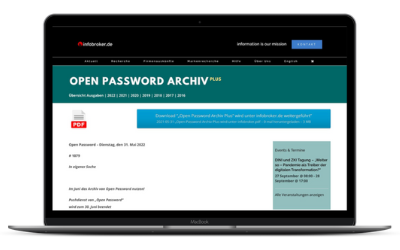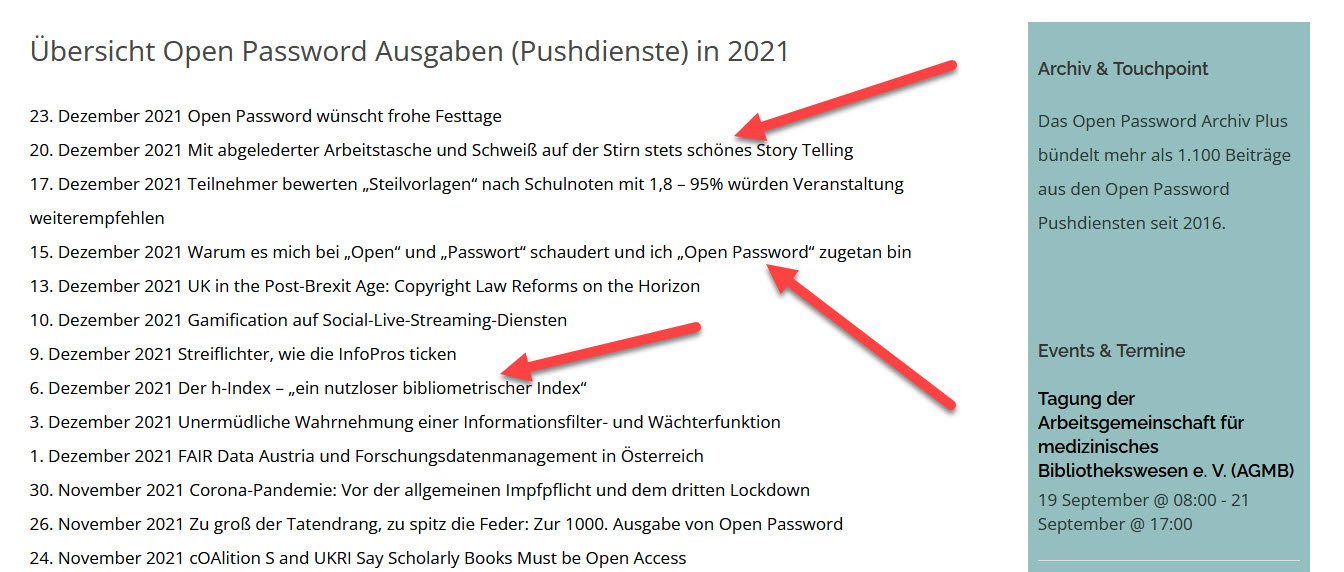Open Password – Freitag,
den 13. Oktober 2017
#266
Ursual Georgy – Richard David Lankes – Bibliotheken – Stakeholder – AKMB-news – Jon von Tetzchner – Google – Opera – Vivaldi – LexisNexis – Larry Page – Sergey Brin – Mozilla – Google Dics – Chrome – Chromium – AdWords – Facebook – Targeted Marketing – Tailored Propaganda – Wired – Regulation – Monopoly in Advertising – Google Analytics – Data Souvereignty – Privacy – Internet and Democracy – Mobile Devices – LexisNexis – Diligencia – Deloitte – Informationssicherheit – Kritische Infrastrukturen
Zitat
Zeit zum Reflektieren für Bibliothekare:
Was wollen meine Stakeholder,
und wie sind sie zu überzeugen?
Ursula Georgy, Neue Anforderungen an Bibliotheken – Ein Buch für Entscheider?, zu: Richard David Lankes: Erwarten Sie mehr! Verlangen Sie bessere Bibliotheken für eine komplexer gewordene Welt /hrsg. und mit einem Vorwort von Hans-Christoph Hobohm. Aus dem Engl. von Erdmute Lapp und Willi Bredemeier, Berlin 2017, in: AKMB-news – Informationen zu Kunst, Museum und Bibliothek
„Das Neue daran ist, dass dieser Aktionsplan (am Ende des Buches für großartige, gute und schlechte Bibliotheken, Red.) in der Tat für Entscheider geschrieben ist, und daher eine neue Perspektive bietet. Und dieser Perspektivenwechsel wird von vielen BibliothekarInnen vielleicht in der Tat zu selten vorgenommen. …
In der jetzigen Fassung scheinen 150 Seiten definitiv zu viel, und so bleibt zu befürchten, dass nur wenige der adressierten Zielgruppe dieses Buch lesen werden. … Aber war es deshalb überflüssig, dieses Buch ins Deutsche zu übersetzen? Sicher nicht, denn es richtet sich definitiv nicht nur an Entscheider, sondern durchaus an Bibliothekare/Bibliothekarinnen, aber auch an die Verbände. Die formulierten Erwartungen können dazu dienen, dass sich jede Bibliothek Gedanken macht, ob sie diese erfüllt und wie die „neuen Erwartungen“ bei den jeweiligen Entscheidungsträgern und Stakeholdern erfüllt werden können. Und die Verbände wie der dbv, die bereits hervorragende Arbeit für ihre Bibliotheken leisten, können noch einmal kritisch reflektieren, ob ihre herausgegebenen Papiere wie z.B. der „Bericht zur Lage der Bibliotheken“ nicht noch stärker auf „neue Erwartungen“ zugeschnitten werden sollte.“
Jon von Tetzchner
As a monopoly in search and advertising
Google is not able
to resist the misuse of power
Is the Internet turning
into a battlefield of propaganda?
How Google should be regulated
Jon von Tetzchner entwickelte die Browser Opera und Vivaldi. Er ist Mitgründer und CEO von Vivaldi Technologies. Zuletzt wandelte er sich vom Google-Enthusiasten zum Google-Kritiker. Im Interview mit Open Password stellt er seine Positionen dar. Der gebürtige Isländer arbeitete lange in Norwegen und residiert neuerdings in der Nähe von Boston.
Let us start with your positive experiences with Google. I have known Google longer than most. At Opera, we were the first to add their search into the browser interface, enabling it directly from the search box and the address field. At that time, Google was an up-and-coming geeky company. I remember vividly meeting with Google’s co-founder Larry Page, his relaxed dress code and his love for the Danger device, which he played with throughout our meeting. Later, I met with the other co-founder of Google, Sergey Brin, and got positive vibes. My first impression of Google was that it was a likeable company.
Our cooperation with Google was a good one. Integrating their search into Opera helped us deliver a better service to our users and generated revenue that paid the bills. We helped Google grow, along with others that followed in our footsteps and integrated Google search into their browsers.
Then the picture for you and for opera darkened. Yes, then things changed. Google increased their proximity with the Mozilla foundation. They also introduced new services such as Google Docs. These services were great, gained quick popularity, but also exposed the darker side of Google. Not only were these services made to be incompatible with Opera, but also encouraged users to switch their browsers. I brought this up with Sergey Brin, in vain. For millions of Opera users to be able to access these services, we had to hide our browser’s identity. The browser sniffing situation only worsened after Google started building their own browser, Chrome.
Now, we are making the Vivaldi browser. It is based on Chromium, an open-source project, led by Google and built on WebKit and KHTML. Using Google’s services should not call for any issues, but sadly, the reality is different. We still have to hide our identity when visiting services such as Google Docs.
And now things have hit a new low. As the biggest online advertising company in the world, Google is often the first choice for businesses that want to promote their products or services on the Internet. Being excluded from using Google AdWords could be a major problem, especially for digital companies.
Recently, our Google AdWords campaigns were suspended without warning. This was the second time that I have encountered this situation. This time, however, timing spoke volumes.
I had several interviews where I voiced concerns about the data gathering and ad targeting practices – in particular, those of Google and Facebook. They collect and aggregate far too much personal information from their users. I see this as a very serious, democracy-threatening problem, as the vast targeting opportunities offered by Google and Facebook are not only good for very targeted marketing, but also for tailored propaganda. The idea of the Internet turning into a battlefield of propaganda is very far away from the ideal.
Two days after my thoughts were published in an article by Wired, we found out that all the campaigns under our Google AdWords account were suspended – without prior warning. Was this just a coincidence? Or was it deliberate, a way of sending us a message?
When we reached out to Google to resolve the issue, we got a clarification masqueraded in the form of vague terms and conditions, some of which, they admitted themselves, were not a “hard” requirement. In exchange for being reinstated in Google’s ad network, their in-house specialists dictated how we should arrange content on our own website and how we should communicate information to our users.
We made effort to understand their explanations and to work with them on their various unreasonable demands (some of which they don’t follow themselves, by the way). After almost three months of back-and-forth, the suspension to our account has been lifted, but only when we bent to their requirements.
A monopoly both in search and advertising, Google, unfortunately, shows that they are not able to resist the misuse of power. I am saddened by this makeover of a geeky, positive company into the bully they are in 2017. I feel blocking competitors on thin reasoning lends credence to claims of their anti-competitive practices. It is also fair to say that Google is now in a position where regulation is needed. I sincerely hope that they’ll get back to the straight and narrow.
________________________________________________________________________
We get free services, but the end result is less choice.
________________________________________________________________________
Then, Google should be more regulated, for economic and political reasons? Our experience shows you that Google is unable to handle the power that they have grown to have over time. They are a monopoly in search and they are a monopoly in online advertising. One may even argue that they have a similar position in maps, mail, online office tools and even translation, not to mention mobile operating systems. By offering these services for free to end users and companies, they have undermined competition in the market, thus limiting the number of companies offering such services independently or at all. It is great to get free services, but when the end result is less choice, we have a problem. There is also the question of changing business models, once any real competition has been wiped out, as we have started to see with many of Google’s services.
Another problem is the amount of information Google collects. I think most people do not realize how much information is collected through our Android mobiles, the Google ad network, that serves most of the online ads, Google search, Google Analytics, which is used by a significant number of the worlds larger sites and various other Google services. The net result is that Google knows more about us than most. That data is then used to analyse us and serve us relevant ads based on who we are. The tools being used to analyse us are getting more and more advanced and we are seeing these tools used to tailor specific advertising and even propaganda, potentially turning the Internet into a battlefield of propaganda, where truth is hard to find. This is a major problem and needs to be resolved.
________________________________________________________________________
It should be illegal to combine data from multiple sites and services.
________________________________________________________________________
How should Google be regulated? We should limit the amount of information that is being collected. In particular we should look at information that is being collected across sites. It should not be legal to combine data from multiple sites and services. The fact that these sites and services are using the same underlying technology does not change the fact that the user’s dealings is with a site at a time and each site should not have the right to share the data with others. I believe this the cornerstone of laws in many countries today, but these laws need to be enforced. Data about us is ours alone and it should not be possible to sell it.
We should also limit the ability to target users individually. In the past, ads on sites were ads on sites. You might know what kind of users visited a site and you would place tech ads on tech sites and fashion ads on fashion sites. Now the ads follow you individually. That should be made illegal as it uses data collected from multiple sources and invades our privacy.
I also believe there should be regulation as to how location data is used and any information related to our mobile devices.
In addition, regulators need to be vigilant as to how companies that have monopoly power use their power. That kind of goes without saying. Companies with monopoly powers should not be able to use those powers when competing in an open market or using their monopoly services to limit competition.
LexisNexis
Neue Wirtschaftsinformationen
aus Nordafrika und dem Iran
LexisNexis baut seine Content-Angebote im Nahen Osten und in Nordafrika aus und hat dafür eine entsprechende Content-Vereinbarung mit Diligencia (Oxford) geschlossen. Dazu der Informationsanbieter: „Diligencia ist ein anerkannter Lieferant von Unternehmensinformationen für den Nahen Osten und Nordafrika (MENA) einschließlich Iran.
Wir wissen, dass unsere Kunden zuverlässige und vertrauenswürdige Unternehmensdaten benötigen, um neue Chancen zu ergreifen, während sie gleichzeitig ihr Compliance-Risiko senken müssen. Aufgrund der hohen Datenqualität hat sich LexisNexis für Diligencia als Partner entschieden. Die Unternehmensprofile werden aus Originalquellen in der lokalen Sprache des Landes, in dem das Unternehmen registriert ist, zusammengestellt und basieren ausschließlich auf offiziellen Quellen wie Ministerien, Lizenzbehörden und Amtsblättern. Sie umfassen eingetragene Geschäftssitze und Kontaktinformationen, Gründungsdatum, Stammkapital, eingetragene Vorstandsmitglieder, Aktionäre, Tochtergesellschaften und lizenzierte Tätigkeiten.
Die zusätzlichen Inhalte greifen verschiedene Herausforderungen auf, denen Unternehmen bei Due-Diligence-Prüfungen oder Business-Intelligence-Untersuchungen zu Unternehmen aus dem Nahen Osten und Nordafrika gegenüberstehen. Der langwierige Weg, Anfragen bei offiziellen Quellen wie dem Handelsregister des Handelsministeriums, der ägyptischen Behörde für ausländische Investitionen (GAFI) oder Amtsblättern zu stellen und auf deren Informationen zu verweisen, bleibt aus. Stattdessen erhalten Unternehmen nun mit nur wenigen Klicks umfassende Unternehmensprofile. Anhand der Profile können die Nutzer im Handumdrehen Eigentumsstrukturen identifizieren, um verbundene Holdings, Tochtergesellschaften und Beteiligungen an Gesellschaften in der MENA-Region zu aufzudecken.“
Anzeige

FAQ + Hilfe



